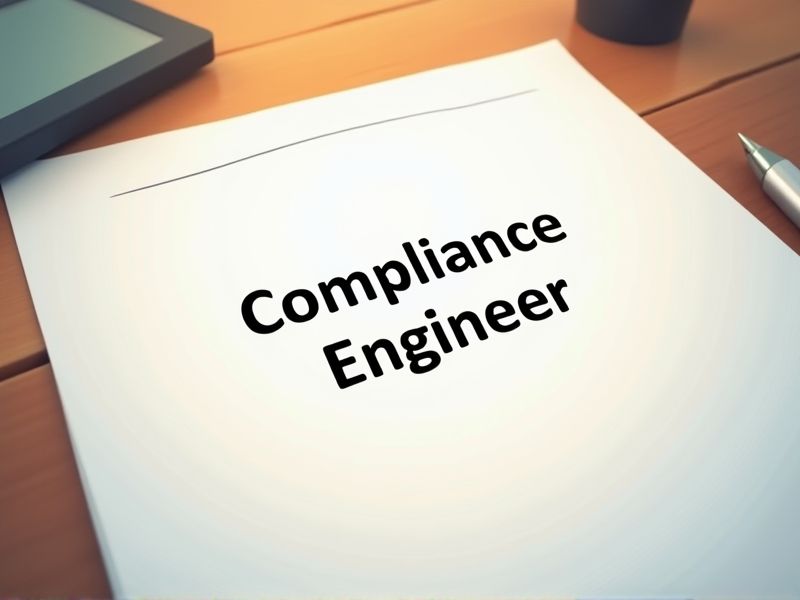
Compliance Engineers operate in environments where meeting regulatory standards is crucial. Holding specific certifications confirms their expertise in navigating complex regulations and ensuring organizational adherence. Such credentials also enhance credibility and can significantly mitigate risks associated with non-compliance. Key certifications you may need for a role as a Compliance Engineer include these.
Certified Compliance & Ethics Professional (CCEP)
Certified Compliance & Ethics Professional (CCEP) designation equips compliance engineers with standardized knowledge of regulatory requirements, enhancing their ability to ensure organizational adherence. The certification provides engineers with essential skills for identifying and mitigating risks effectively, reducing potential financial and legal penalties. A CCEP credential demonstrates a commitment to ethical practices, which can elevate a compliance engineer's credibility within the industry. As organizations globally face increasing regulatory scrutiny, a certified compliance engineer becomes vital for maintaining operational integrity and trust.
ISO 9001:2015 Lead Auditor Certification
Obtaining the ISO 9001:2015 Lead Auditor Certification equips a Compliance Engineer with the essential skills to effectively audit quality management systems, ensuring they meet international standards. This certification enables the engineer to identify non-conformities and areas for improvement, facilitating enhanced organizational compliance. It also validates the engineer's expertise in quality assurance processes, increasing credibility with stakeholders. Achieving this certification can lead to better career opportunities, as it is highly regarded in industries that prioritize quality and regulatory adherence.
ISO/IEC 27001 Lead Implementer Certification
ISO/IEC 27001 Lead Implementer Certification equips a Compliance Engineer with a comprehensive understanding of information security management systems, which is critical for ensuring organizational adherence to global security standards. It enhances the engineer's capability to identify vulnerabilities, thus reducing the risk of data breaches and non-compliance penalties. The certification demonstrates the engineer's expertise in implementing best practices, leading to improved trust with clients and stakeholders. Organizations benefit from having certified professionals, as it streamlines the audit process and supports compliance with legal and regulatory requirements.
Certified Information Systems Auditor (CISA)
Obtaining the CISA certification equips a Compliance Engineer with a deep understanding of IT system audits, which enhances their ability to assess regulatory adherence. Training in CISA highlights potential security breaches and compliance gaps, crucial for managing risk effectively. The certification ensures proficiency in implementing and monitoring controls, aligning with industry standards. Organizations prioritize hiring Compliance Engineers with CISA credentials due to their verified expertise in safeguarding information systems integrity.
ITIL Foundation Certification
A Compliance Engineer's role requires a strong understanding of systematic process management, which ITIL Foundation Certification provides by introducing key IT service management concepts. This certification equips the engineer with best practices for aligning IT services with business processes, aiding in compliance adherence. Familiarity with ITIL principles enhances the engineer's ability to implement effective risk management processes. ITIL training supports the development of documentation and reporting skills, critical for demonstrating compliance to regulatory bodies.
Six Sigma Green Belt Certification
Six Sigma Green Belt Certification equips Compliance Engineers with skills to enhance process efficiency, reducing errors and defects, which is crucial for maintaining regulatory standards. Understanding and applying Six Sigma methodologies aid in identifying process inefficiencies, leading to more effective compliance management. Certified knowledge in statistical analysis empowers engineers to implement data-driven improvements, ensuring adherence to compliance requirements. Enhanced problem-solving capabilities from this certification support continual process evaluation and improvement, essential for sustaining compliance in dynamic regulatory environments.
Certified Quality Engineer (CQE)
A Certified Quality Engineer (CQE) provides valuable expertise in quality control and assurance, crucial for a compliance engineer facing regulatory challenges. Their understanding of statistical methods helps to identify trends, ensuring compliance with industry standards. CQEs possess problem-solving skills that enable them to address non-conformities, reducing risks of regulatory violations. Their experience in process improvements aligns with a compliance engineer's goal of maintaining high-quality standards.
OSHA 30-Hour Training Certification
Compliance Engineers are responsible for ensuring workplace safety, making the OSHA 30-Hour Training critical for understanding health and safety standards. This certification equips them with the knowledge to identify and mitigate potential hazards, minimizing workplace accidents. The training also helps in maintaining regulatory compliance, avoiding legal penalties and financial losses. Employers regard this certification as a credential that enhances a compliance engineer's ability to implement safety protocols effectively.
Certified Risk and Information Systems Control (CRISC)
Compliance Engineers often deal with complex regulatory standards that require precise risk management techniques. Earning a CRISC certification equips them with the skills to assess and manage the unique risks associated with IT systems, ensuring these align with industry regulations. The certification provides a structured framework for identifying, evaluating, and addressing risks, essential for maintaining organizational compliance. CRISC-certified professionals are recognized for their expertise in governance and risk management, making them valuable assets in environments with strict compliance requirements.
Certified Internal Auditor (CIA)
Possessing a Certified Internal Auditor (CIA) credential enhances a compliance engineer's understanding of internal control systems. This deeper knowledge aids in identifying compliance gaps and optimizes risk management. Employers recognize the CIA as a mark of proficiency, increasing trust in the compliance engineer's assessments. The synergy of compliance engineering and auditing competencies improves organizational adherence to regulations and standards.
Summary
As a recipient of certifications, you can anticipate enhanced job prospects and career advancement opportunities. Employers often perceive certified compliance engineers as more knowledgeable and reliable, increasing your credibility. Earning certifications can also deepen your technical skills and understanding of regulatory standards. This creates a competitive edge in the rapidly evolving compliance landscape.
